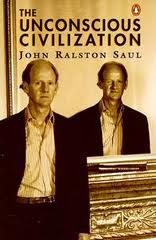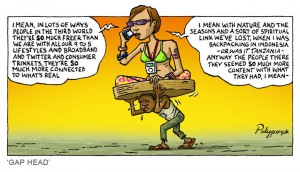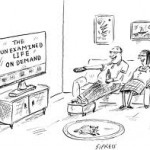I began talking about John Ralston Saul’s book back here, though on that occasion I mainly focussed on the writer. Here is the first part of my precis of this short, bold, stimulating, even visionary book.
“Know thyself.” “The unexamined life is not worth living.” John Ralston Saul might have chosen these Socratic aphorisms to lead off The Unconscious Civilization, his 1995 lecture series and book. Instead, he chose a slightly more modern reference to self-knowledge, and his fundamental argument is that this same imperative of understanding applies to societies and even entire civilizations, hence his title.
Saul argues that mere propaganda has become a domineering substitute for the socially constructive use of language in public discourse. He warns that our practice of what we call ‘democracy’ is in fact warped and even thwarted by the steady march of corporatist thinking. He complains that Western economies and skills don’t so much grow, in genuinely productive ways, as they metastasize through the unproductive, occult but highly praised manipulations of money managers and economic adventurers (think: mortgage bubbles and dot.com
millionaires). He laments our societal loss of equilibrium, and the unexamined ideologies that produce so many of the polarities that unbalance the world, among which the extremes of wealth and poverty are becoming ever more large and more obviously threatening.
Each of these four ideas has its own lecture/chapter in The Unconscious Civilization, but the introductory one is the focus for today. I think I can do it in 500 words or less. Saul called his opening essay “The Great Leap Backwards”, a cutting play on Maoist China’s disastrous “Great Leap Forward” of the ‘50s and ‘60s. My short summary of Saul’s ideas is done partly for the sake of personal study, but mostly to distill and share some useful notions about what in the world are we doing and where in the hell are we headed and how, as Saul believes, we might choose more civilized paths by choosing greater consciousness.
The Great Leap Backwards
- Individualism has been hijacked. Nowhere in traditional Western thought “was the individual seen as a single ambulatory centre of selfishness…” Corporatism discourages individuals from acting like citizens, with autonomy and concern for the public good.
- “The overall effects on the individual are passivity and conformity in those areas which matter and non-conformism in those which don’t.”
- Democracy was not born of economics, was not “a child of the Industrial Revolution”; does anybody remember Athens?
- Economics (which engineered “a Nobel Prize in its own honour…via bank financing”) is a minor, failure-ridden profession, too big for its britches and our societal health.
- Our civilization is childish because we don’t remember. The “courtiers” of the managerial class preside over our economic woes; however “the very size and prosperity of the elite permits it to interiorize an artificial vision of civilization”. Crisis? What crisis?
- “Murder” (partly due to international arms trading, 50 million have died since the “peace” of 1945), “astonishing Third World statistics” (child labour, poverty, malnourishment), and “the crisis inside the West” (chronic unemployment for millions, etc.) show the failures of our system.
- Ideologies (neo-fascism, neo-conservatism) grow in the absence of memory and vision. “We suffer from an addictive weakness for large illusions”, such as religions; consider the “new all-powerful clockmaker god – the marketplace and its sidekick, technology”. The marketplace, fascism and Marxism are “all corporatist, managerial and hooked on technology as their own particular golden calf”.
- Leaders mainly sing from the same hymn-book: social cutbacks, globalism, it’s-the-economy-stupid, let the marketplace (and the “1 percent”) decide; this breeds (and requires) passivity and over-simplification.
- Corporatism is intrinsically hierarchical and elitist, and therefore heedless of “the common good”; like fascism, it devalues liberty and equality and substitutes family and jingoism.
- Questions like what is man or what is civilization lead to pre-fabricated ideological answers. “What could civilization be?” is better, more like Socrates, who died for “doubting the absolute truths of others”.
- Social legitimacy has four possible historical sources: God, kings, groups, individuals. The last is best, because the other three when in power devalue the individual, and are incorrigibly self-interested; only the individual is capable of selflessness.
- Corporatism rules today. We treasure our so-called individuality, but in matters of importance, we act “first as a group member….In corporatism, [legitimacy] lies with the group, not the citizen.”
- We need a “citizen-based society” based on “disinterest and participation”. The contemporary West has unprecedented wealth, and yet “no money for the public good. In a democracy this would not be the case”.
- The titular “Great Leap Backwards” means descent into thoughtless, passive
subjugation. We have no agency or responsibility, and therefore embrace the ignorance, blissful or otherwise, that ideology recommends.
- We must avoid wasting thought and time on “the service roads of economics”, and prefer the main roads of Western tradition, such as Cicero’s “the good of the people is the chief law”. We should seek nothing less than “delight in mankind”: engagement by individuals who share a sense of social good.
I lied. I only was able to cut it down to 565 words. I’ll do better on the second essay — to paraphrase Twain, I didn’t have time to write a shorter summary. Sleep calls. did it! 500 on the nose. There are disembodies phrases and bleeding words all over my desk, but this goes to show that even a writer can keep promises.
This post has been belatedly updated to reflect possible OCD symptoms and a tardy commitment to trivial honour. (March ’14)



